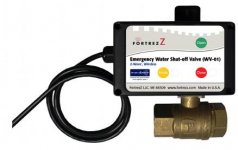Hastey
Oklahoma Chapter Leaders
You should really replace your supply lines every 5 years as suggested and spend the extra money and buy good braided lines.
I am the Master of the Masonic Lodge in Henryetta, OK and this morning my Sr. Warden calls me in a panic. A water line busted upstairs and flooded the building, collapsed the ceiling in the kitchen and dinning room, ruined approx 80% of the carpet and wood floors, and who knows what else. The insurance adjuster will be there tomorrow and we are going to start cleaning at 0700 in the morning.
It was one of them nylon Wal-Mart supply lines on a commode. The city has had the water on and off for the last week fixing lines.
Bottom Line is that little hose just cost us thousands of dollars. Check your homes and if you don't already add them to your maintenance list. After today I've got a whole new look on things and I believe that I am going to start shutting the water off at the house when I leave for trips.
I am the Master of the Masonic Lodge in Henryetta, OK and this morning my Sr. Warden calls me in a panic. A water line busted upstairs and flooded the building, collapsed the ceiling in the kitchen and dinning room, ruined approx 80% of the carpet and wood floors, and who knows what else. The insurance adjuster will be there tomorrow and we are going to start cleaning at 0700 in the morning.
It was one of them nylon Wal-Mart supply lines on a commode. The city has had the water on and off for the last week fixing lines.
Bottom Line is that little hose just cost us thousands of dollars. Check your homes and if you don't already add them to your maintenance list. After today I've got a whole new look on things and I believe that I am going to start shutting the water off at the house when I leave for trips.

